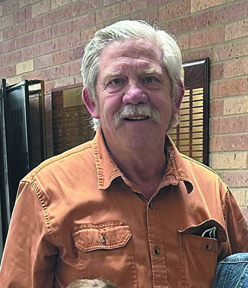PASTOR’S CORNER, Dr. Jeff Nagell, Friends Church of Liberal
If you are like me, you have already seen a dozen or more commercials about a big holiday coming up soon – Christmas.
Don’t get me wrong, I like Christmas, but the great calendar-makers of all time decided we needed to stop and be thankful before piling up gifts and trinkets before the really fun holiday to come. Not to imitate The Grinch, but Christmas can’t be Christmas without a moment to think about all the good we already have. It’s like the old question “What do you say to an atheist who sneezes?” “I don’t know.” “Exactly.”
So who do we thank on Thanksgiving?
I have stood around a Thanksgiving table and been asked to pray. I am a pastor, so I get paid to do that. To break the monotony, I will ask the assembled group “What are you thankful for today?” before the prayer. There is a short period of “What?!” followed by a few safe answers such as “I’m thankful for family” or “I’m thankful for my job” or “I’m thankful I didn’t have to go into work today.” Those are easy answers, but the hard question is not asked – “To whom are you thankful, and why?”
It is the “to whom” of thankfulness that makes the holiday a holy day. The Pilgrims and Abraham Lincoln both agreed there was a “to whom” in the question of a day of thanksgiving. If there is a God to whom we ought to be thankful, there ought to be a blessing for doing it. To acknowledge the gift is to also recognize the giver. We cannot be completely thankful for something we earned.
What is the benefit of being thankful? It turns out gratitude is beneficial for our mental health in how we focus on what we have rather than obsessing over what we don’t have. Acknowledging there is a “to whom” we are to be thankful means we can also be thankful for what we do not have. Not that there are not millions of U.S. citizens who want to win the lottery, but can you imagine the burden of walking around with millions of dollars and not having a clue about what that means?
Gratitude gives us a new way to experience life. It seems easy to list the things we do not have, but what happens if instead, we list the things we do have? Health, breath, friends, our life experiences, the freedom to live our lives more or less the way we choose are generally benefits we take for granted unless we lose some of them.
One public source recommends we can improve our outlook on life if we make a practice of focusing on things we have to be thank for rather than the problems we have. A wise person once observed “Worry is paying interest on problems that may never come.” Thankfulness is observing what we already have in the present tense. For example, focusing on those who have encouraged us along the way is much more helpful than focusing on all the negative voices we allow to shout in our heads. Of course, as we take the time to thank God for our lives, we can also recognize how He is still at work.
The New Testament explodes with calls to be thankful because God is at work, including “Thanks be to God! He gives us victory through our Lord Jesus Christ (1 Corinthians 15:57); “Joyfully giving thanks to the Father, who has qualified you to share in the inheritance of the saints in the kingdom of light” (Colossians 1:11); “And whatever you do, whether in word or deed, do all in the name of the Lord Jesus Christ, giving thanks to God the Father through him.” (Colossians 3:17).
Ronald Reagan loved telling the story of two brothers – one was always depressed, and the other eternally optimistic. A therapist was called in to try and find a balance. The pessimistic boy was ushered into a room full of toys and within an hour was bored of them all. The optimistic boy was ushered into a room full of manure and excitedly began digging in it. When the therapist asked why, he said “All of this manure, I’m betting there’s a pony in here.”
The need for thankfulness is greatest in a land of plenty. We seem to assume we deserve to have everything we want – not need – in a world where most of the population considers clean water a luxury. It may be a tonic for some to know you cannot be thankful and depressed at the same time. Do the math – if you are truly thankful, how can you be depressed? If you are depressed, try counting your blessings and see if there are more on the good side than the bad.








